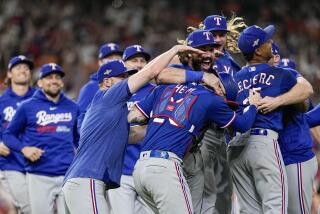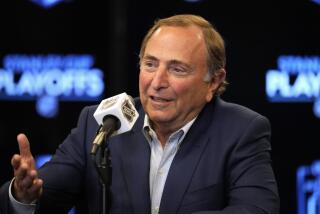High Price : Coaching Cost Rangers’ Mike Keenan His Family and Peace of Mind, so He Is Trying to Remake His Image to Save Himself
- Share via
NEW YORK — Bob Clarke knew it would come to this. That someday, unless Mike Keenan learned to release his bottled-up compassion, his life would be as empty as the dove-gray walls in his impersonal new office.
“I used to tell him, ‘Mike, one day you’re going to win the Stanley Cup and you’re not going to have anybody to share it with because everybody hates you,’ ” Clarke said. “ ‘Hopefully, you’ll win it someday and guys will want to put their arms around you.’ ”
New York has embraced Keenan as a winner because he has coached the Rangers to a 16-1-3 record since Oct. 24. They have overtaken Toronto for the NHL’s highest points total. But without his wife and teen-age daughter, who remained in Chicago after he accepted the Rangers’ offer in April, Keenan has little to hold besides a new resolve to allow his true nature to show through.
That nature is sensitive, caring, compassionate, he says. There’s an element of calculation in his willingness to bare his soul, as if he’s marketing himself like a detergent. New! Improved! Cares better!
Yet, there’s also anguish in his face as he stares out the window of his office at the Rangers’ practice rink.
“The perception is that I’m Iron Mike, without compassion and a very tough taskmaster without compassion,” he said. “I think people have come to realize I have protected myself to a degree, insulated myself, because I’m a lot more caring and a lot more sensitive than people would ever imagine. . . .
“My wife (from whom he is separated) didn’t bargain for this type of life. She thought she was marrying a high school teacher. As things have evolved, there are a lot more demands than teaching high school or teaching at the university level. My drive, my competitiveness was that I wanted to see and do more. I have taken some responsibility for that. You do make choices. But it’s not for everyone.
“This is an industry where we’re extremely well compensated, but I’ve paid the ultimate price. The most important thing to me in my life, I’ve lost.”
Whatever sensitivity he had, he hid behind abrasiveness. His trademarks were his upthrust chin--so like Scotty Bowman--his glares and his roasting of players, first in Philadelphia, where he coached the Flyers to the Cup finals twice; and then in Chicago, where he revitalized the Blackhawks and took them to the 1992 finals.
“He’s looking to win hockey games and trying to pull triggers to win hockey games, and he doesn’t care how he does it,” said Dave Poulin, the Flyer captain during Keenan’s tenure. “But you look at it, and most guys had the best years of their careers under him. His methods aren’t important to him. What’s important is winning.”
It was so important, it turned him into a despot.
“He got a bit carried away, a bit extreme,” said Clarke, formerly the Flyer general manager and now in that same job with the Florida Panthers. “It was worse than what he wanted it to be, and he just got out of control. A lot of it was caused his first year there (1984-85) because on paper, we should never have gotten to the finals and expectations of the organization changed. There was a lot of pressure on him to continue it. Every time we would lose, Mike thought it was the end of the world.”
But away from the rink, Keenan was charming. A frequent dinner guest at Clarke’s house, he played the piano with Clarke’s four youngsters, asked about their schoolwork, joined them in games.
“The gentleness and kindness he had for my children, he didn’t show to his players,” Clarke said.
He went to great lengths to keep it from showing.
“The stories about Scotty walking down the sidewalk and crossing the street when he saw an athlete walking on the same side, to avoid him, was the same type of protective mechanism I used, and it was nothing to do with disdain or dislike for an individual,” Keenan said. “It was almost the contrary to that. The reason we did it was we felt we would be too vulnerable ourselves if we got too close to the individuals. . . .
“I wanted people to begin to know who I was and who I am, and I wanted to feel the positive aspects of having relationships with people that are more positive. I think it’s better for your own growth and development. That’s being true to yourself. That’s the type of person I am.”
He’s handling players with more compassion, but that’s not to say he is soft. When defenseman Brian Leetch was tentative on the ice in his return from a broken leg, Keenan benched him to make Leetch realize his lack of aggressiveness was shortchanging the team. When it became clear that nine-year mainstay James Patrick would never be the defenseman Keenan wanted on the point on the power play, he benched Patrick and eventually forced a deal that sent Patrick to Hartford.
The Rangers, who last season missed the playoffs under Roger Neilson a year after compiling the league’s best record, have accepted Keenan. They have the league’s stingiest defense, most potent power play and deadliest penalty killing.
“It wouldn’t hurt the Rangers to play for Keenan for a couple of years,” said one NHL general manager. “I wouldn’t want my son to be coached by him, but for a one-shot deal, he’s the guy.”
Mark Messier, whose undermining of Neilson led to last season’s collapse, is an enthusiastic and important Keenan supporter.
“There’s so many facets to what a coach needs,” Messier said. “One of them is a rapport with his players, and Mike has done a tremendous job in that regard. He has the ability to reach not only one or two players, but everyone.
“He came in under a pretty tough set of circumstances, and he instilled a lot of confidence in us. He made the players believe we are a good team and that if we do play well, we’ll win. He’s done a great job since he’s been here.”
So great was the Rangers’ need for a proven winner that General Manager Neil Smith accepted the potential threat posed by Keenan having served in that capacity in Chicago. Keenan insists he has no aspirations beyond coaching, preferring to spend the off-season with his daughter and not with his peers. The Rangers will also pay Keenan $3.5 million for five years and, in essence, fire the players instead of the coach if personalities clash.
“There isn’t a coach around except Al Arbour who has lasted a long time and you can say hasn’t worn out on the team,” Smith said. “You’ve got to take into consideration (what might happen) down the road and maybe adjust the players because of his technique.”
Will his technique bring the Rangers their first Stanley Cup since 1940? As if to remind him of his mission, a picture of the Stanley Cup hangs in his office. That photo, and a clock, are the lone adornments.
“I hope that I’ve learned something along the way throughout my coaching development, and I hope I continue to grow and improve and get better at responsibility and my job,” he said. “I’ve coached at every level imaginable and I think you learn from that, each of those coaching experiences. I liken it to a player. If they’re the same in Year 10 as they were in Year 1, they haven’t grown much or learned much. I hope I continue to learn and grow in every situation I’m involved in.”
More to Read
Go beyond the scoreboard
Get the latest on L.A.'s teams in the daily Sports Report newsletter.
You may occasionally receive promotional content from the Los Angeles Times.







